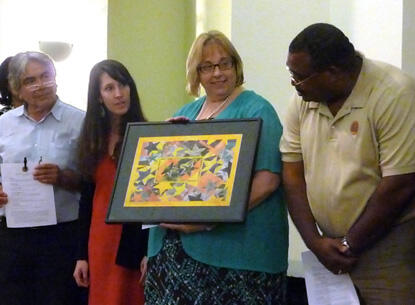
May 11, 2011
A Celebration of Town and Gown
VCU’s Council for Community Engagement awards grants and recognizes outstanding university-community partnerships
Share this story
Virginia Commonwealth University’s Council for Community Engagement has awarded one-year grants totaling $100,000 to six university-community programs.
The Community Engagement grant awards were announced at a reception for university and community partners May 10 at the University Student Commons.
Sheryl Garland, vice president for health policy and community relations and co-chair for the Council for Community Engagement, told the group of about 100 in attendance that the grants support important university-community partnerships, a critical component of VCU’s overall mission.
“This is an opportunity to uplift the university-community partnerships that are mutually beneficial to all involved. It is also a time to launch our new partnerships,” Garland said.
Other speakers acknowledged the university’s culture of community engagement.
“This is, to me, a perfect example of who we are as a university,” said Sheldon M. Retchin, M.D., CEO of the VCU Health System and vice president for VCU Health Sciences. “It speaks to the heart and core of who we are because it speaks to the importance we place on community engagement and community partnerships.”
The six grantees were selected from a group of applicants representing programs on both campuses. Grants were awarded to:
Traumatic Brain Injury Family Support: A Multi-Family Model, a partnership between the School of Social Work, Department of Physical Medicine and Rehabilitation and the Brain Injury Association of Virginia to improve holistic family functioning following traumatic brain injury.
Open Minds, a collaboration of the departments of English, Religious Studies, Women’s Studies and African American Studies and the Richmond City Jail that enables 40 residents of the jail and 40 VCU students to learn from each other the many social problems surrounding crime.
Dental Fair for Native Americans in Virginia, a partnership between the Departments of Gerontology and Dental Hygiene, the School of Dentistry and the Rappahannock Tribe to host a two-day dental fair that will provide preventative and restorative care to Native Americans from the state’s 11 tribes.
ArtSmarts: An Intensive, SOL-Integrated Art Program for Richmond Public Schools, a joint effort between the Departments of Education and Art Education and the Virginia Museum of Fine Arts to support an intensive art education program for third graders at two elementary schools in Richmond.
Assessing the Needs of the Asian-American Community in Richmond, a partnership between the School of Social Work, Department of Psychology and the Asian American Society of Central Virginia that will identify the social, health care and mental health needs of the local Asian-American community.
Pixie’s Pen Pals: A Program for Virginia’s Inmates, a collaboration of the Department of Psychology, School of Medicine, School of Business and community partners FETCH-a-Cure’s Pixie’s Pen Pals and the Virginia Department of Corrections to evaluate the Pixie’s Pen Pals program, an untested form of animal-assisted therapy in which inmates learn to train shelter dogs.
The Council for Community Engagement also recognized three outstanding university-community partnerships, including one that was also designated this year’s “Currents of Change” award winner.
The award for exemplary partnership teaching and learning went to the Salvation Army Dental Outreach Program, in which the Student Chapter of the American Dental Hygienist Association under faculty guidance from the School of Dentistry provided oral cancer screenings, dental screenings, oral health education and tobacco cessation and dietary counseling.
The award for exemplary partnership in outreach was given to The Caregiver Telephone Support Program: A High-Touch, Low-Tech Program to Assist Home-Based Caregivers, which allowed students in the Department of Gerontology to offer support through telephone conversations to caregivers, offering easy access that met caregivers’ schedules.
The award for exemplary partnership in research went to the Community Partnership for Ethical Research (CPER), a National Institutes of Health-funded partnership designed to develop and test a new model for community engagement that was initially based on the need for community consultation and public disclosure for exception from informed consent research. Over the past 18 months, this collaboration has designed and tested new roles and responsibilities for Community Advocates Research.
The project matched VCU’s Departments of Internal Medicine and Emergency Medicine and the Center for Clinical Translational Research with community partners CARITAS, Baptist General Convention of Virginia, Mill House, Epilepsy Foundation of Virginia, Daily Planet, Crossover Ministry, Richmond City Health District, Richmond Ambulance Authority and the Urban League of Greater Richmond.
The Community Partnership for Ethical Research also received the “Currents of Change” award for overall excellence.
The “Currents of Change” winner received an autographed and framed limited-edition print of the “STAR,” a watercolor by W. Baxter Perkinson, D.D.S., a School of Dentistry alumnus, former rector of the Board of Visitors and current vice president of the VCU Health System Authority.
Garland said VCU’s community engagement efforts over the past year have made a major impact, raising tens of thousands of pounds of food for the Central Virginia Food Bank, cleaning up surrounding neighborhoods during fall and spring semester “Paint the Town Green” projects led by the Student Government Association, hosting Earth Day activities on both campuses and providing volunteers for Project Homeless Connect and Affordable Housing Week activities.
Garland said a recently established VCU Neighborhood team is working proactively to make the university a “good neighbor” to its neighbors and the Caring to Act Calendar, which completed its second year, has made it easier for people and organizations at VCU to find opportunities to volunteer in the community.
Organizers also discussed the university’s increasing service-learning efforts, which include more than 115 service-learning courses offered by more than 60 different instructors. More than 2,500 undergraduate and graduate students enroll in the courses each year, contributing hundreds of thousands of hours of service to community projects.
Subscribe to VCU News
Subscribe to VCU News at newsletter.vcu.edu and receive a selection of stories, videos, photos, news clips and event listings in your inbox.










